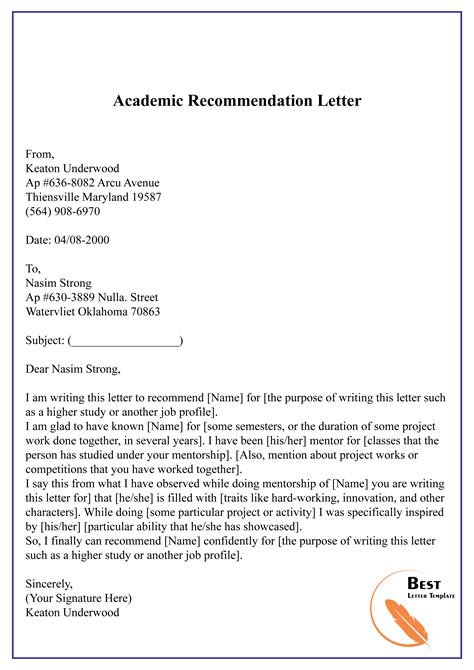Examples Of Academic Reference Letters

Academic reference letters are an important part of the application process for students who are pursuing higher education. These letters are typically written by professors, mentors, or other professionals who have worked closely with the student and can attest to their academic abilities, personal qualities, and potential for success.
What is an Academic Reference Letter?
An academic reference letter is a document that provides an assessment of a student’s academic performance and potential. It is typically used as part of the application process for graduate school, internships, scholarships, and other academic opportunities.
Who Should Write an Academic Reference Letter?
Academic reference letters should be written by individuals who have worked closely with the student and can provide an honest assessment of their academic abilities, personal qualities, and potential for success in their chosen field. This may include professors, advisors, mentors, or supervisors.
What Should be Included in an Academic Reference Letter?
An academic reference letter should include the following information:
- The writer’s contact information
- The student’s name and contact information
- The relationship between the writer and the student
- An assessment of the student’s academic abilities and potential
- An assessment of the student’s personal qualities and character
- Specific examples of the student’s achievements and accomplishments
- An evaluation of the student’s potential for success in their chosen field
How Should an Academic Reference Letter be Structured?
An academic reference letter should be structured as follows:
- Introduction
- Body
- Conclusion
The introduction should briefly introduce the writer and their relationship to the student, as well as provide an overview of the purpose of the letter. The body should provide a detailed assessment of the student’s academic abilities and personal qualities, as well as specific examples to support those assessments. The conclusion should summarize the writer’s assessment of the student and their potential for success.
What Should be Avoided in an Academic Reference Letter?
An academic reference letter should avoid the following:
- Exaggerating or embellishing the student’s achievements or abilities
- Providing irrelevant or trivial information
- Making unsupported or unverifiable claims
- Using inappropriate or unprofessional language
Example of an Academic Reference Letter
Dear Admissions Committee,
I am writing to provide a reference for Jane Smith, who is applying to your master’s program in psychology. I have had the pleasure of working with Jane for the past two years as her academic advisor, and I can confidently attest to her academic abilities, personal qualities, and potential for success in the field of psychology.
Jane is an exceptional student who consistently demonstrates a deep understanding of the material and a passion for learning. She is highly motivated and dedicated to her studies, and she consistently produces work that is of the highest quality. In addition to her academic abilities, Jane is also a kind, compassionate, and empathetic individual who is deeply committed to helping others.
During her time at XYZ University, Jane has been actively involved in a number of extracurricular activities, including volunteering at a local mental health clinic and serving as a mentor for incoming freshmen. These experiences have allowed her to develop strong interpersonal skills and a deep understanding of the challenges facing individuals with mental health issues.
Overall, I strongly recommend Jane for your master’s program in psychology. She is an exceptional student, a dedicated learner, and a compassionate individual who has the potential to make a significant impact in the field of psychology.
Sincerely,
John Doe
Conclusion
Academic reference letters are an important part of the application process for students who are pursuing higher education. They provide a valuable assessment of a student’s academic abilities, personal qualities, and potential for success. By following the guidelines outlined above, writers can create effective and meaningful reference letters that will help their students achieve their academic and professional goals.
FAQs
What is the purpose of an academic reference letter?
An academic reference letter is used to provide an assessment of a student’s academic abilities, personal qualities, and potential for success. It is typically used as part of the application process for graduate school, internships, scholarships, and other academic opportunities.
Who should write an academic reference letter?
Academic reference letters should be written by individuals who have worked closely with the student and can provide an honest assessment of their academic abilities, personal qualities, and potential for success in their chosen field. This may include professors, advisors, mentors, or supervisors.
What should be included in an academic reference letter?
An academic reference letter should include the writer’s contact information, the student’s name and contact information, the relationship between the writer and the student, an assessment of the student’s academic abilities and potential, an assessment of the student’s personal qualities and character, specific examples of the student’s achievements and accomplishments, and an evaluation of the student’s potential for success in their chosen field.
